Module 4 Home alone Unit 1 I can look after myself, although it won’t be easy for me. 课件39张PPT
文档属性
| 名称 | Module 4 Home alone Unit 1 I can look after myself, although it won’t be easy for me. 课件39张PPT |  | |
| 格式 | zip | ||
| 文件大小 | 1.9MB | ||
| 资源类型 | 教案 | ||
| 版本资源 | 外研版 | ||
| 科目 | 英语 | ||
| 更新时间 | 2020-08-02 16:48:42 | ||
图片预览

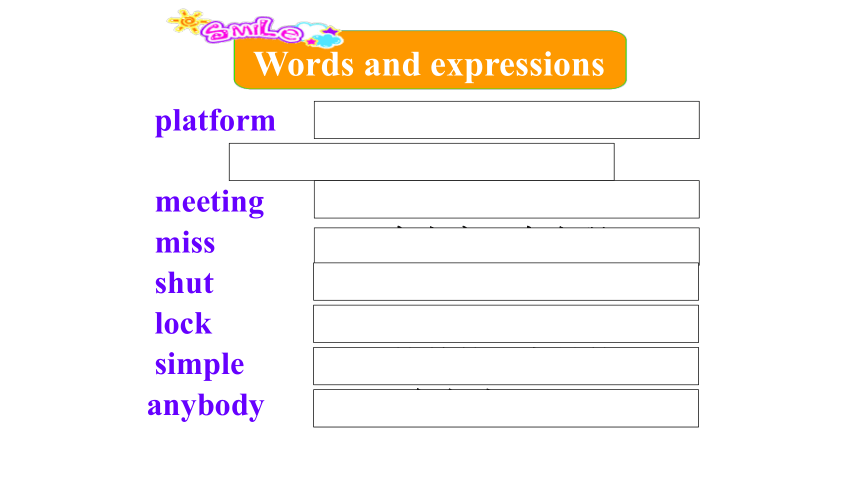
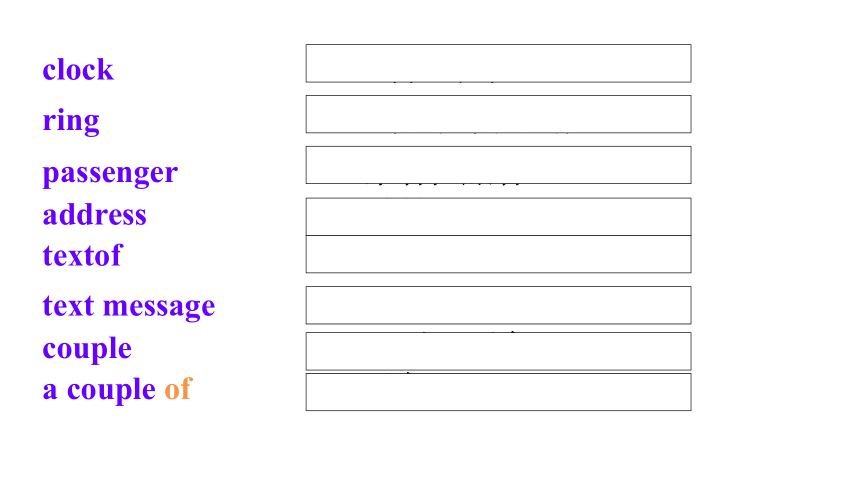

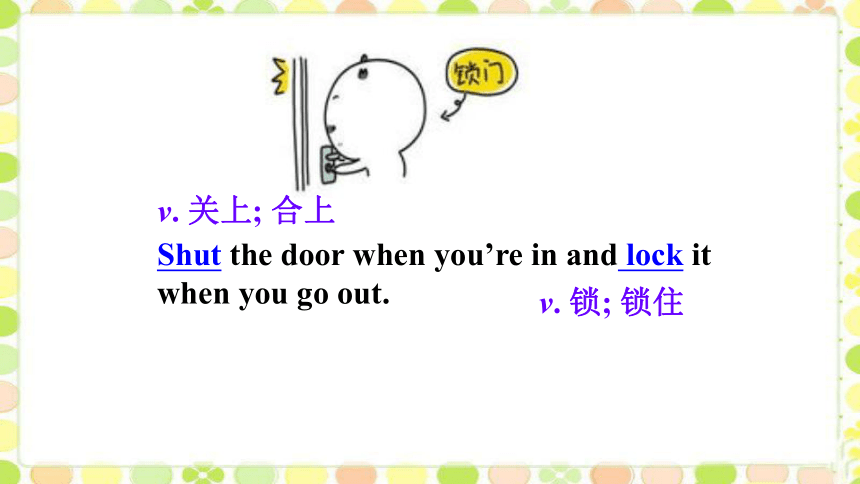


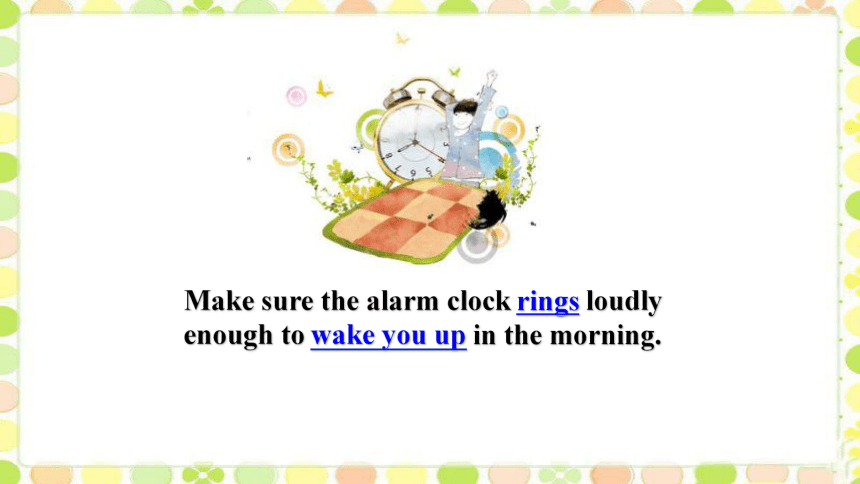
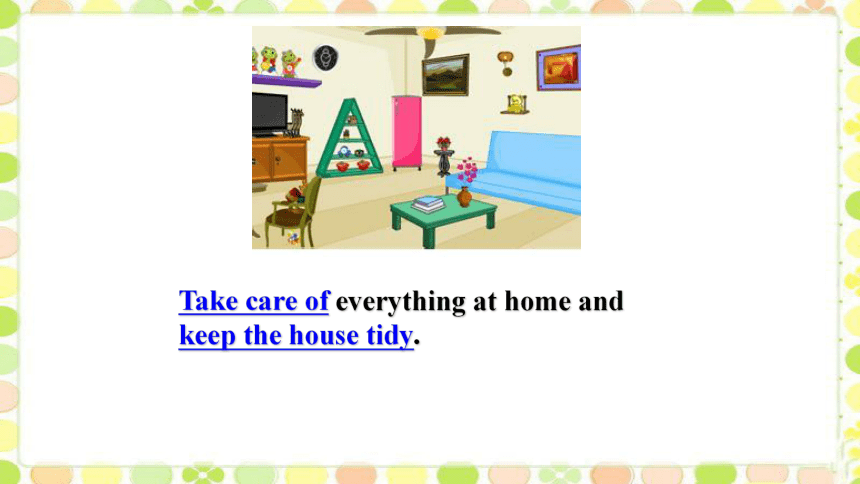
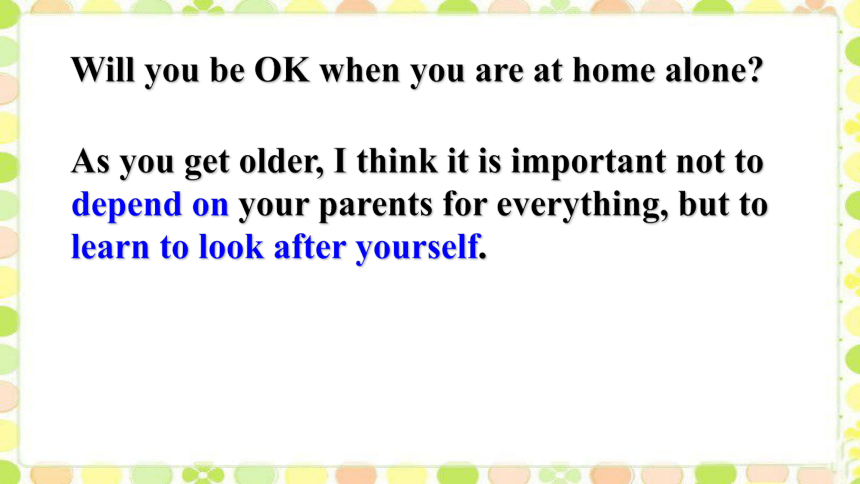
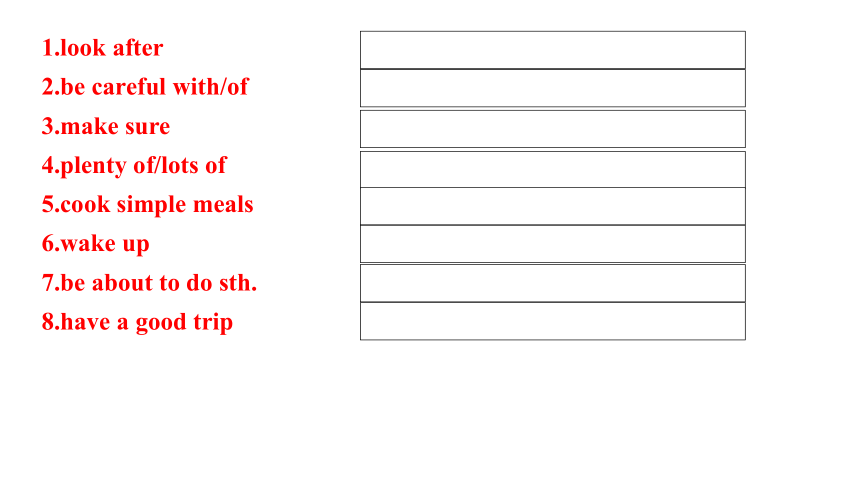
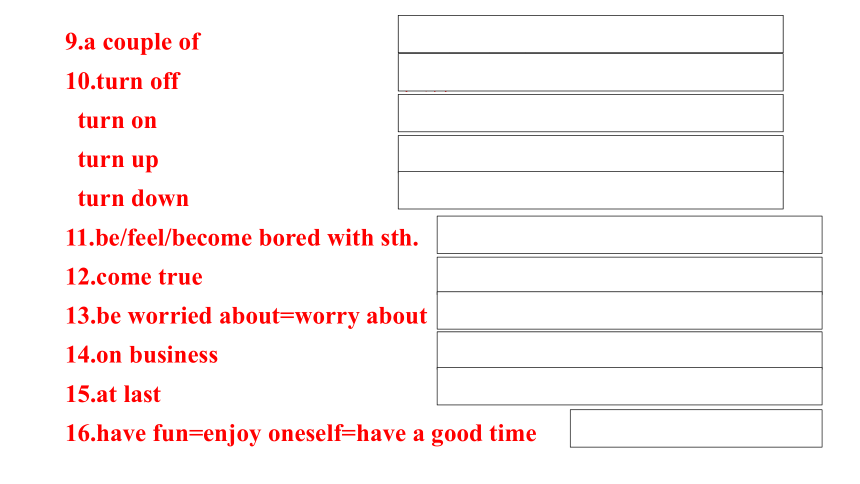
文档简介
(共39张PPT)
Module
4
Home
alone
Unit
1
I
can
look
after
myself,
although
it
won’t
be
easy
for
me.
Words
and
expressions
platform
n.
(供上下火车用的)月
台;站台
meeting
n.
会议,集会
miss
v.
未出席;未出现
shut
v.
关上;合上
lock
v.
锁;锁住
simple
adj.
简单的;容易的
anybody
pron.
任何人
Words
and
expressions
clock
n.
钟;时钟
ring
v.
鸣响;发出铃声
passenger
n.
乘客;旅客
address
n.
地址
textof
n.
文本;正文;
text
message
短信
couple
n.
一对;两个
a
couple
of
两个
What
do
you
need
to
do
to
look
after
yourself
when
you
are
at
home
alone?
Shut
the
door
when
you’re
in
and
lock
it
when
you
go
out.
v.
关上;
合上
v.
锁;
锁住
Make
sure
you
eat
plenty
of
fresh
fruit
and
vegetables.
If
you
can
cook,
it’s
better
to
cook
simple
meals
for
yourself.
Make
sure
the
alarm
clock
rings
loudly
enough
to
wake
you
up
in
the
morning.
Take
care
of
everything
at
home
and
keep
the
house
tidy.
As
you
get
older,
I
think
it
is
important
not
to
depend
on
your
parents
for
everything,
but
to
learn
to
look
after
yourself.
Will
you
be
OK
when
you
are
at
home
alone?
1.look
after
照顾
2.be
careful
with/of
小心对待
3.make
sure
确保
4.plenty
of/lots
of
许多,大量
5.cook
simple
meals
做简单的饭菜
6.wake
up
醒;醒来
7.be
about
to
do
sth.
将要/打算做某事
8.have
a
good
trip
旅途愉快
9.a
couple
of
两个,几个
10.turn
off
关掉
turn
on
打开
turn
up
调大,调开
turn
down
调小,调低
11.be/feel/become
bored
with
sth.
对某事感到厌烦
12.come
true
实现
13.be
worried
about=worry
about
担心
14.on
business
出差
15.at
last
最后,终于
16.have
fun=enjoy
oneself=have
a
good
time
过得愉快
17.as
soon
as
一……就
18.hurry
to
do
sth.
匆忙做某事
19.ask
sb.
for
sth.
向某人要某物
20.
hand
in
上交
21.be
unable
to
do
sth.
不能做某事
22.all
day
long
整天
23.feel
tired
and
sleepy
感到又累又困
24.help
sb.
with
sth.
=
help
sb.
(to)
do
sth.
帮助某人做某事
25.on
time
按时
in
time
及时
26.
say
goodbye
to
sb.
和某人道别
27.see
sb.
off
送别某人
28.be
pleased
to
do
sth
乐于做某事
29.get
ready
to
do
sth.
=
get
ready
for
sth.
为……做好准备
30.fight
with
sb.
与某人争吵/
打架
31.in
a
hurry
匆忙
32.by
accident
无意,偶然
33.later
on
后来
34.take
away
带走
35.wait
for
等候
can’t
wait
to
do
sth.
迫不及待地做某事
36.in
danger
处于危险中
37.point
out
指出
38.for
example
例如
39.advise
sb.
to
do
sth.
建议某人做某事
40.want
to
do
sth.
想要做某事
41.have
to
do
sth
不得不做某事
42.try
to
do
sth.
设法做某事
43.start
to
do
sth
开始做某事
44.be
happy
to
do
sth
做某事很高兴
45.tell
sb
to
do
sth
告诉某人做某事
46.learn
to
do
sth
学会做某事
Work
in
pairs.
Talk
about
the
picture.
Where
are
Betty
and
her
parents?
They
are
at
the
railway
station.
Is
Betty
travelling
with
her
parents?
NO,
she
isn’t.
Betty
is
seeing
off
her
parents.
What’s
their
train
number?
T27
to
Lhasa.
It’s
leaving
from
Platform
2.
Her
parents
will
attend
a
meeting
in
Lhasa.
Where
are
Betty’s
parents
leaving
for?
Lhasa.
Betty:
Don’t
worry.
I
can
cook
simple
meals.
Dad:
There
won’t
be
anybody
to
wake
you
up
in
the
morning.
Betty:
I’ll
be
fine.
My
clock
rings
so
loudly
that
it
will
certainly
wake
me
up.
Mum:
I’m
sure
I’ve
forgotten
something,
but
I
don’t
know
what
it
is!
(Announcement:
We
advise
all
passengers
for
Train
T27
to
Lhasa
to
go
immediately
to
Platform
2.
Your
train
is
about
to
leave.)
Betty:
That’s
your
train!
Goodbye
Mum,
goodbye
Dad.
Mum:
I
know!
I
haven’t
given
you
our
address
in
Lhasa!
Betty:
Send
me
a
text
message.
Have
a
good
trip!
Mum:
Bye,
my
dear!
Betty:
Bye!
See
you
in
a
couple
of
weeks!
1.
Betty’s
parents
are
going
to
_______.
2.
Her
parents
tell
her
to
________________
________________.
3.
Betty
can
________________.
4.
Betty’s
parents
usually
_____________
______________.
5.
Betty’s
mum
has
not
_______________
________________.
Lhasa
be
careful
with…/
eat
fresh
fruit…
look
after
herself
wake
her
up
in
the
morning
given
her
their
address
in
Lhasa
Read
and
complete
the
sentences.
There
may
be
more
than
one
answer.
address
lock
meeting
passenger
ring
shut
text
message
“I
haven’t
given
you
our
address
in
Lhasa!”
This
means
you
do
not
know
where
we
are
staying
/
what
we
are
doing.
Choose
the
correct
answer.
2.
You
see
passengers
travelling
by
train
/
staying
at
home.
3.
When
your
clock
rings,
it
is
quiet
/
makes
a
loud
noise.
4.
You
receive
a
text
message
on
your
phone
/
by
email.
5.
When
the
door
is
shut,
it
is
open
/
closed.
6.
When
you
lock
the
door,
you
keep
people
out
/
let
people
in.
7.
At
a
meeting,
you
meet
people
for
work
/
fun.
1.
So
am
I,
but
I
can’t
miss
two
weeks
of
school.
So
am
I承接上一句贝蒂妈妈说的话:
…
I’m
sorry
you
can’t
come
with
us,
Betty.
(贝蒂,
你不能和我们一起去,
很遗憾),
表示“我也很遗憾无法同行”。
“So
+
be/助动词+主语”这一结构表示自己与前一个人的情况相同或同意一个人的说法,
意思是“……也这样”。
e.g.
Joe
was
a
little
upset,
and
so
was
I.
乔有点不开心,
我也有点儿。
He
has
been
ill,
and
so
has
his
wife.
他一直生着病,
他妻子也一样。
Neil
left
just
after
midnight,
and
so
did
Jack.
尼尔一过午夜就走了,
杰克也是。
miss
v.
未出席;
未出现
后面出现动词时,
应该用动词的-ing形式。
e.g.
Get
up
early
or
you
will
miss
the
early
bus.
She
missed
going
to
the
party
on
Saturday.
miss作动词还有“想念”的意思。
miss作名词意为“女士;
小姐”,
此时m必须大写,
常用于姓名或姓之前,
尤指未婚女子。如:
Miss
Brown。
Betty:
Don’t
worry.
I
can
cook
simple
meals.
Dad:
There
won’t
be
anybody
to
wake
you
up
in
the
morning.
Betty:
I’ll
be
fine.
My
clock
rings
so
loudly
that
it
will
certainly
wake
me
up.
Mum:
I’m
sure
I’ve
forgotten
something,
but
I
don’t
know
what
it
is!
(Announcement:
We
advise
all
passengers
for
Train
T27
to
Lhasa
to
go
immediately
to
Platform
2.
Your
train
is
about
to
leave.)
Betty:
That’s
your
train!
Goodbye
Mum,
goodbye
Dad.
Mum:
I
know!
I
haven’t
given
you
our
address
in
Lhasa!
Betty:
Send
me
a
text
message.
Have
a
good
trip!
Mum:
Bye,
my
dear!
Betty:
Bye!
See
you
in
a
couple
of
weeks!
simple
adj.
简单的;容易的
He
wrote
a
story
in?simple?English.
??
他用简单的英语写了一则故事。
I
cooked
myself
a?simple?breakfast.
??
我给自己做了一顿简单的早饭。
比较级和最高级形式为:simpler,
simplest
simply
adv.
简单地;仅仅
3.
I
can
cook
simple
meals.
simple,
easy都可以表示“做某事或理解某事没有太大困难”。其区别是:
simple是个最一般的词,
指不复杂或不难懂,
因此能很快被头脑接受;
easy也是一个最一般的词,
常指事情容易做,
不费劲。
The
plan
sounds?simple.
这个计划听起来相当简单。
It
is
very
easy
to
do
this
thing.
做这件事非常容易。
知识链接
Betty:
Don’t
worry.
I
can
cook
simple
meals.
Dad:
There
won’t
be
anybody
to
wake
you
up
in
the
morning.
Betty:
I’ll
be
fine.
My
clock
rings
so
loudly
that
it
will
certainly
wake
me
up.
Mum:
I’m
sure
I’ve
forgotten
something,
but
I
don’t
know
what
it
is!
(Announcement:
We
advise
all
passengers
for
Train
T27
to
Lhasa
to
go
immediately
to
Platform
2.
Your
train
is
about
to
leave.)
Betty:
That’s
your
train!
Goodbye
Mum,
goodbye
Dad.
Mum:
I
know!
I
haven’t
given
you
our
address
in
Lhasa!
Betty:
Send
me
a
text
message.
Have
a
good
trip!
Mum:
Bye,
my
dear!
Betty:
Bye!
See
you
in
a
couple
of
weeks!
2.
There
won’t
be
anybody
to
wake
you
up
in
the
morning.
anybody
pron.
任何人
常用于否定句或疑问句中;
当用于肯定句
中时,
相当于any
person,
意为“任何人”。
e.g.
I
will
not
tell
anybody
the
secret.
??????
Is
there
anybody
in
the
office?
??????
Anybody
could
do
it!
Betty:
Don’t
worry.
I
can
cook
simple
meals.
Dad:
There
won’t
be
anybody
to
wake
you
up
in
the
morning.
Betty:
I’ll
be
fine.
My
clock
rings
so
loudly
that
it
will
certainly
wake
me
up.
Mum:
I’m
sure
I’ve
forgotten
something,
but
I
don’t
know
what
it
is!
(Announcement:
We
advise
all
passengers
for
Train
T27
to
Lhasa
to
go
immediately
to
Platform
2.
Your
train
is
about
to
leave.)
Betty:
That’s
your
train!
Goodbye
Mum,
goodbye
Dad.
Mum:
I
know!
I
haven’t
given
you
our
address
in
Lhasa!
Betty:
Send
me
a
text
message.
Have
a
good
trip!
Mum:
Bye,
my
dear!
Betty:
Bye!
See
you
in
a
couple
of
weeks!
3.
My
clock
ring
so
loudly
that
it
will
certainly
wake
me
up.
ring
v.
鸣响;
发出铃声
e.g.
The?telephone?is?ringing.
电话铃响了。
ring作动词还有“打电话”的意思。
e.g.
I’ll
ring
you
up
as
soon
as
they
arrive.
他们一到我就给你打电话。
Betty:
Don’t
worry.
I
can
cook
simple
meals.
Dad:
There
won’t
be
anybody
to
wake
you
up
in
the
morning.
Betty:
I’ll
be
fine.
My
clock
rings
so
loudly
that
it
will
certainly
wake
me
up.
Mum:
I’m
sure
I’ve
forgotten
something,
but
I
don’t
know
what
it
is!
(Announcement:
We
advise
all
passengers
for
Train
T27
to
Lhasa
to
go
immediately
to
Platform
2.
Your
train
is
about
to
leave.)
Betty:
That’s
your
train!
Goodbye
Mum,
goodbye
Dad.
Mum:
I
know!
I
haven’t
given
you
our
address
in
Lhasa!
Betty:
Send
me
a
text
message.
Have
a
good
trip!
Mum:
Bye,
my
dear!
Betty:
Bye!
See
you
in
a
couple
of
weeks!
4.
Your
train
is
about
to
leave.
be
about
to
do
sth.
的意思是“就要/
正要……”.
e.g.
We
were
just
about
to
leave
when
Jerry
arrived.
杰里来的时候,
我们正准备走。
She
looked
as
if
she
was
about
to
cry.
她看上去好像要哭了。
Betty:
Don’t
worry.
I
can
cook
simple
meals.
Dad:
There
won’t
be
anybody
to
wake
you
up
in
the
morning.
Betty:
I’ll
be
fine.
My
clock
rings
so
loudly
that
it
will
certainly
wake
me
up.
Mum:
I’m
sure
I’ve
forgotten
something,
but
I
don’t
know
what
it
is!
(Announcement:
We
advise
all
passengers
for
Train
T27
to
Lhasa
to
go
immediately
to
Platform
2.
Your
train
is
about
to
leave.)
Betty:
That’s
your
train!
Goodbye
Mum,
goodbye
Dad.
Mum:
I
know!
I
haven’t
given
you
our
address
in
Lhasa!
Betty:
Send
me
a
text
message.
Have
a
good
trip!
Mum:
Bye,
my
dear!
Betty:
Bye!
See
you
in
a
couple
of
weeks!
5.
See
you
in
a
couple
of
weeks!
couple
作名词,
意为“一对;
两个”。它
常用于固定短语a
couple
of,
表示“两
个”。
e.g.
She
has
a
couple
of
friends
at
school.
她在学校有两个朋友。
couple
/
pair
这两个名词均有“一对;
两个”之意。
couple
多指在一起或彼此有关系的两个人或两个同样的事物;
pair
含义广泛,
可指人或物,
用于物时,
指两个互属的事物,
缺此或失彼都会失去使用价值,
或指由相对称的两部分构成的一件东西。
e.g.
I
found
a
couple
of
socks
in
the
bedroom
but
they
don’t
make
a
pair.
couple,
pair均有“一对,一双”之意。
couple多指在一起或彼此有关系的两个人或两个同样的事物。
pair含义广泛,可指人或物。用于物时,指两个互属的事物,缺此或失彼都会失去使用价值,或指由相对称的两部分构成的一件东西。
I
found
a
couple
of
socks
in
the
room
but
they
do
not
make
a
pair.
我在房间找到两只袜子,
但不是一双的。
知识链接
1.
两周前我们在北京见过面。
We
met
in
Beijing
__
_______
____
weeks
ago.
2.
我妈妈每天早晨六点钟把我叫醒。
My
mother
_____
me
____
at
six
every
morning.
根据汉语意思完成英语句子,
每空一词。
a
couple
of
wake
up
3.
昨天谁给他发了一条短信?
Who
sent
him
a
____
________
yesterday?
4.
你出去时要特别当心那条狗。
Please
___
_________
________
_____
that
dog
when
you
go
out.
text
message
be
especially
careful
with
Module
4
Home
alone
Unit
1
I
can
look
after
myself,
although
it
won’t
be
easy
for
me.
Words
and
expressions
platform
n.
(供上下火车用的)月
台;站台
meeting
n.
会议,集会
miss
v.
未出席;未出现
shut
v.
关上;合上
lock
v.
锁;锁住
simple
adj.
简单的;容易的
anybody
pron.
任何人
Words
and
expressions
clock
n.
钟;时钟
ring
v.
鸣响;发出铃声
passenger
n.
乘客;旅客
address
n.
地址
textof
n.
文本;正文;
text
message
短信
couple
n.
一对;两个
a
couple
of
两个
What
do
you
need
to
do
to
look
after
yourself
when
you
are
at
home
alone?
Shut
the
door
when
you’re
in
and
lock
it
when
you
go
out.
v.
关上;
合上
v.
锁;
锁住
Make
sure
you
eat
plenty
of
fresh
fruit
and
vegetables.
If
you
can
cook,
it’s
better
to
cook
simple
meals
for
yourself.
Make
sure
the
alarm
clock
rings
loudly
enough
to
wake
you
up
in
the
morning.
Take
care
of
everything
at
home
and
keep
the
house
tidy.
As
you
get
older,
I
think
it
is
important
not
to
depend
on
your
parents
for
everything,
but
to
learn
to
look
after
yourself.
Will
you
be
OK
when
you
are
at
home
alone?
1.look
after
照顾
2.be
careful
with/of
小心对待
3.make
sure
确保
4.plenty
of/lots
of
许多,大量
5.cook
simple
meals
做简单的饭菜
6.wake
up
醒;醒来
7.be
about
to
do
sth.
将要/打算做某事
8.have
a
good
trip
旅途愉快
9.a
couple
of
两个,几个
10.turn
off
关掉
turn
on
打开
turn
up
调大,调开
turn
down
调小,调低
11.be/feel/become
bored
with
sth.
对某事感到厌烦
12.come
true
实现
13.be
worried
about=worry
about
担心
14.on
business
出差
15.at
last
最后,终于
16.have
fun=enjoy
oneself=have
a
good
time
过得愉快
17.as
soon
as
一……就
18.hurry
to
do
sth.
匆忙做某事
19.ask
sb.
for
sth.
向某人要某物
20.
hand
in
上交
21.be
unable
to
do
sth.
不能做某事
22.all
day
long
整天
23.feel
tired
and
sleepy
感到又累又困
24.help
sb.
with
sth.
=
help
sb.
(to)
do
sth.
帮助某人做某事
25.on
time
按时
in
time
及时
26.
say
goodbye
to
sb.
和某人道别
27.see
sb.
off
送别某人
28.be
pleased
to
do
sth
乐于做某事
29.get
ready
to
do
sth.
=
get
ready
for
sth.
为……做好准备
30.fight
with
sb.
与某人争吵/
打架
31.in
a
hurry
匆忙
32.by
accident
无意,偶然
33.later
on
后来
34.take
away
带走
35.wait
for
等候
can’t
wait
to
do
sth.
迫不及待地做某事
36.in
danger
处于危险中
37.point
out
指出
38.for
example
例如
39.advise
sb.
to
do
sth.
建议某人做某事
40.want
to
do
sth.
想要做某事
41.have
to
do
sth
不得不做某事
42.try
to
do
sth.
设法做某事
43.start
to
do
sth
开始做某事
44.be
happy
to
do
sth
做某事很高兴
45.tell
sb
to
do
sth
告诉某人做某事
46.learn
to
do
sth
学会做某事
Work
in
pairs.
Talk
about
the
picture.
Where
are
Betty
and
her
parents?
They
are
at
the
railway
station.
Is
Betty
travelling
with
her
parents?
NO,
she
isn’t.
Betty
is
seeing
off
her
parents.
What’s
their
train
number?
T27
to
Lhasa.
It’s
leaving
from
Platform
2.
Her
parents
will
attend
a
meeting
in
Lhasa.
Where
are
Betty’s
parents
leaving
for?
Lhasa.
Betty:
Don’t
worry.
I
can
cook
simple
meals.
Dad:
There
won’t
be
anybody
to
wake
you
up
in
the
morning.
Betty:
I’ll
be
fine.
My
clock
rings
so
loudly
that
it
will
certainly
wake
me
up.
Mum:
I’m
sure
I’ve
forgotten
something,
but
I
don’t
know
what
it
is!
(Announcement:
We
advise
all
passengers
for
Train
T27
to
Lhasa
to
go
immediately
to
Platform
2.
Your
train
is
about
to
leave.)
Betty:
That’s
your
train!
Goodbye
Mum,
goodbye
Dad.
Mum:
I
know!
I
haven’t
given
you
our
address
in
Lhasa!
Betty:
Send
me
a
text
message.
Have
a
good
trip!
Mum:
Bye,
my
dear!
Betty:
Bye!
See
you
in
a
couple
of
weeks!
1.
Betty’s
parents
are
going
to
_______.
2.
Her
parents
tell
her
to
________________
________________.
3.
Betty
can
________________.
4.
Betty’s
parents
usually
_____________
______________.
5.
Betty’s
mum
has
not
_______________
________________.
Lhasa
be
careful
with…/
eat
fresh
fruit…
look
after
herself
wake
her
up
in
the
morning
given
her
their
address
in
Lhasa
Read
and
complete
the
sentences.
There
may
be
more
than
one
answer.
address
lock
meeting
passenger
ring
shut
text
message
“I
haven’t
given
you
our
address
in
Lhasa!”
This
means
you
do
not
know
where
we
are
staying
/
what
we
are
doing.
Choose
the
correct
answer.
2.
You
see
passengers
travelling
by
train
/
staying
at
home.
3.
When
your
clock
rings,
it
is
quiet
/
makes
a
loud
noise.
4.
You
receive
a
text
message
on
your
phone
/
by
email.
5.
When
the
door
is
shut,
it
is
open
/
closed.
6.
When
you
lock
the
door,
you
keep
people
out
/
let
people
in.
7.
At
a
meeting,
you
meet
people
for
work
/
fun.
1.
So
am
I,
but
I
can’t
miss
two
weeks
of
school.
So
am
I承接上一句贝蒂妈妈说的话:
…
I’m
sorry
you
can’t
come
with
us,
Betty.
(贝蒂,
你不能和我们一起去,
很遗憾),
表示“我也很遗憾无法同行”。
“So
+
be/助动词+主语”这一结构表示自己与前一个人的情况相同或同意一个人的说法,
意思是“……也这样”。
e.g.
Joe
was
a
little
upset,
and
so
was
I.
乔有点不开心,
我也有点儿。
He
has
been
ill,
and
so
has
his
wife.
他一直生着病,
他妻子也一样。
Neil
left
just
after
midnight,
and
so
did
Jack.
尼尔一过午夜就走了,
杰克也是。
miss
v.
未出席;
未出现
后面出现动词时,
应该用动词的-ing形式。
e.g.
Get
up
early
or
you
will
miss
the
early
bus.
She
missed
going
to
the
party
on
Saturday.
miss作动词还有“想念”的意思。
miss作名词意为“女士;
小姐”,
此时m必须大写,
常用于姓名或姓之前,
尤指未婚女子。如:
Miss
Brown。
Betty:
Don’t
worry.
I
can
cook
simple
meals.
Dad:
There
won’t
be
anybody
to
wake
you
up
in
the
morning.
Betty:
I’ll
be
fine.
My
clock
rings
so
loudly
that
it
will
certainly
wake
me
up.
Mum:
I’m
sure
I’ve
forgotten
something,
but
I
don’t
know
what
it
is!
(Announcement:
We
advise
all
passengers
for
Train
T27
to
Lhasa
to
go
immediately
to
Platform
2.
Your
train
is
about
to
leave.)
Betty:
That’s
your
train!
Goodbye
Mum,
goodbye
Dad.
Mum:
I
know!
I
haven’t
given
you
our
address
in
Lhasa!
Betty:
Send
me
a
text
message.
Have
a
good
trip!
Mum:
Bye,
my
dear!
Betty:
Bye!
See
you
in
a
couple
of
weeks!
simple
adj.
简单的;容易的
He
wrote
a
story
in?simple?English.
??
他用简单的英语写了一则故事。
I
cooked
myself
a?simple?breakfast.
??
我给自己做了一顿简单的早饭。
比较级和最高级形式为:simpler,
simplest
simply
adv.
简单地;仅仅
3.
I
can
cook
simple
meals.
simple,
easy都可以表示“做某事或理解某事没有太大困难”。其区别是:
simple是个最一般的词,
指不复杂或不难懂,
因此能很快被头脑接受;
easy也是一个最一般的词,
常指事情容易做,
不费劲。
The
plan
sounds?simple.
这个计划听起来相当简单。
It
is
very
easy
to
do
this
thing.
做这件事非常容易。
知识链接
Betty:
Don’t
worry.
I
can
cook
simple
meals.
Dad:
There
won’t
be
anybody
to
wake
you
up
in
the
morning.
Betty:
I’ll
be
fine.
My
clock
rings
so
loudly
that
it
will
certainly
wake
me
up.
Mum:
I’m
sure
I’ve
forgotten
something,
but
I
don’t
know
what
it
is!
(Announcement:
We
advise
all
passengers
for
Train
T27
to
Lhasa
to
go
immediately
to
Platform
2.
Your
train
is
about
to
leave.)
Betty:
That’s
your
train!
Goodbye
Mum,
goodbye
Dad.
Mum:
I
know!
I
haven’t
given
you
our
address
in
Lhasa!
Betty:
Send
me
a
text
message.
Have
a
good
trip!
Mum:
Bye,
my
dear!
Betty:
Bye!
See
you
in
a
couple
of
weeks!
2.
There
won’t
be
anybody
to
wake
you
up
in
the
morning.
anybody
pron.
任何人
常用于否定句或疑问句中;
当用于肯定句
中时,
相当于any
person,
意为“任何人”。
e.g.
I
will
not
tell
anybody
the
secret.
??????
Is
there
anybody
in
the
office?
??????
Anybody
could
do
it!
Betty:
Don’t
worry.
I
can
cook
simple
meals.
Dad:
There
won’t
be
anybody
to
wake
you
up
in
the
morning.
Betty:
I’ll
be
fine.
My
clock
rings
so
loudly
that
it
will
certainly
wake
me
up.
Mum:
I’m
sure
I’ve
forgotten
something,
but
I
don’t
know
what
it
is!
(Announcement:
We
advise
all
passengers
for
Train
T27
to
Lhasa
to
go
immediately
to
Platform
2.
Your
train
is
about
to
leave.)
Betty:
That’s
your
train!
Goodbye
Mum,
goodbye
Dad.
Mum:
I
know!
I
haven’t
given
you
our
address
in
Lhasa!
Betty:
Send
me
a
text
message.
Have
a
good
trip!
Mum:
Bye,
my
dear!
Betty:
Bye!
See
you
in
a
couple
of
weeks!
3.
My
clock
ring
so
loudly
that
it
will
certainly
wake
me
up.
ring
v.
鸣响;
发出铃声
e.g.
The?telephone?is?ringing.
电话铃响了。
ring作动词还有“打电话”的意思。
e.g.
I’ll
ring
you
up
as
soon
as
they
arrive.
他们一到我就给你打电话。
Betty:
Don’t
worry.
I
can
cook
simple
meals.
Dad:
There
won’t
be
anybody
to
wake
you
up
in
the
morning.
Betty:
I’ll
be
fine.
My
clock
rings
so
loudly
that
it
will
certainly
wake
me
up.
Mum:
I’m
sure
I’ve
forgotten
something,
but
I
don’t
know
what
it
is!
(Announcement:
We
advise
all
passengers
for
Train
T27
to
Lhasa
to
go
immediately
to
Platform
2.
Your
train
is
about
to
leave.)
Betty:
That’s
your
train!
Goodbye
Mum,
goodbye
Dad.
Mum:
I
know!
I
haven’t
given
you
our
address
in
Lhasa!
Betty:
Send
me
a
text
message.
Have
a
good
trip!
Mum:
Bye,
my
dear!
Betty:
Bye!
See
you
in
a
couple
of
weeks!
4.
Your
train
is
about
to
leave.
be
about
to
do
sth.
的意思是“就要/
正要……”.
e.g.
We
were
just
about
to
leave
when
Jerry
arrived.
杰里来的时候,
我们正准备走。
She
looked
as
if
she
was
about
to
cry.
她看上去好像要哭了。
Betty:
Don’t
worry.
I
can
cook
simple
meals.
Dad:
There
won’t
be
anybody
to
wake
you
up
in
the
morning.
Betty:
I’ll
be
fine.
My
clock
rings
so
loudly
that
it
will
certainly
wake
me
up.
Mum:
I’m
sure
I’ve
forgotten
something,
but
I
don’t
know
what
it
is!
(Announcement:
We
advise
all
passengers
for
Train
T27
to
Lhasa
to
go
immediately
to
Platform
2.
Your
train
is
about
to
leave.)
Betty:
That’s
your
train!
Goodbye
Mum,
goodbye
Dad.
Mum:
I
know!
I
haven’t
given
you
our
address
in
Lhasa!
Betty:
Send
me
a
text
message.
Have
a
good
trip!
Mum:
Bye,
my
dear!
Betty:
Bye!
See
you
in
a
couple
of
weeks!
5.
See
you
in
a
couple
of
weeks!
couple
作名词,
意为“一对;
两个”。它
常用于固定短语a
couple
of,
表示“两
个”。
e.g.
She
has
a
couple
of
friends
at
school.
她在学校有两个朋友。
couple
/
pair
这两个名词均有“一对;
两个”之意。
couple
多指在一起或彼此有关系的两个人或两个同样的事物;
pair
含义广泛,
可指人或物,
用于物时,
指两个互属的事物,
缺此或失彼都会失去使用价值,
或指由相对称的两部分构成的一件东西。
e.g.
I
found
a
couple
of
socks
in
the
bedroom
but
they
don’t
make
a
pair.
couple,
pair均有“一对,一双”之意。
couple多指在一起或彼此有关系的两个人或两个同样的事物。
pair含义广泛,可指人或物。用于物时,指两个互属的事物,缺此或失彼都会失去使用价值,或指由相对称的两部分构成的一件东西。
I
found
a
couple
of
socks
in
the
room
but
they
do
not
make
a
pair.
我在房间找到两只袜子,
但不是一双的。
知识链接
1.
两周前我们在北京见过面。
We
met
in
Beijing
__
_______
____
weeks
ago.
2.
我妈妈每天早晨六点钟把我叫醒。
My
mother
_____
me
____
at
six
every
morning.
根据汉语意思完成英语句子,
每空一词。
a
couple
of
wake
up
3.
昨天谁给他发了一条短信?
Who
sent
him
a
____
________
yesterday?
4.
你出去时要特别当心那条狗。
Please
___
_________
________
_____
that
dog
when
you
go
out.
text
message
be
especially
careful
with
同课章节目录
- Module 1 Wonders of the world
- Unit 1 It's more than 2,000 years old.
- Unit 2 The Grand Canyon was not just big.
- Unit 3 Language in use
- Module 2 Public holidays
- Unit 1 My family always go somewhere interesting a
- Unit 2 We have celebrated the festival since the f
- Unit 3 Language in use
- Module 3 Heroes
- Unit 1 She trained hard,so she became a great play
- Unit 2There were few doctors, so he had to work ve
- Unit 3 Language in use
- Module 4 Home alone
- Unit 1 I can look after myself, although it won’t
- Unit 2 I became so bored with their orders that I
- Unit 3 Language in use
- Module 5 Museums
- Unit 1 Don't cross that rope!
- Unit 2 If you ever go to London, make sure you vis
- Unit 3 Language in use
- Module 6 Problems
- Unit 1 If I start after dinner, I'll finish it be
- Unit 2 If you tell him the truth now, you will sho
- Unit 3 Language in use
- Revision Module A
- Module 7 Great books
- Unit 1 We're still influenced by Confucius's idea
- Unit 2 It is still read and loved.
- Unit 3 Language in use
- Module 8 Sports life
- Unit 1 Daming wasn't chosen for the team last time
- Unit 2 He was invited to competitions around the w
- Unit 3 Language in use
- Module 9 Great inventions
- Unit 1 Will computers be used more than books in t
- Unit 2 Will books be replaced by the Internet?
- Unit 3 Language in use
- Module 10 Australia
- Unit 1 I have some photos that I took in Australia
- Unit 2 The game that they like most is Australian
- Unit 3 Language in use
- Module 11 Photos
- Unit 1 He's the boy who won the photo competition
- Unit 2 The photo which we liked best was taken by
- Unit 3 Language in use
- Module 12 Save our world
- Unit 1 If everyone starts to do something, the wor
- Unit 2 Repeat these three words daily: reduce, reu
- Unit 3 Language in use
- Revision Module B
